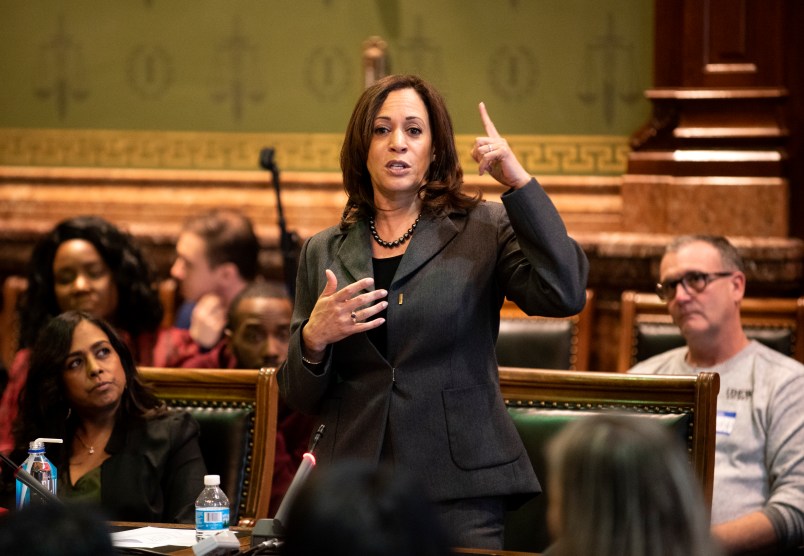From the beginning of the primary season I thought that Kamala Harris was the logical nominee, at least by a process of elimination. I don’t mean that I thought she would necessarily be the nominee or the was the best candidate. But if I listed out half a dozen boxes to check, she was the one candidate who seemed to check all of them. She had a lot of strong qualifiers and lacked the borderline disqualifiers that many of the others had.
I still think that. But one thing that worries me is she seems to have a penchant for making categorical statements that don’t seem core to her campaign but which could be major problems for her if she’s the nominee.
The question of school busing and the larger question of school desegregation is complicated and fraught. I got in a conversation on Twitter last night about the historical memories of busing, the fact that it’s been a dormant issue at the national level for decades. One fellow journalist pointed out that much of the historical memory of busing is based on bad history. There is also a lot of fairly good academic work demonstrating that busing had a good record at accomplishing its stated goals. With all that said, if the topic is court-mandated busing regimes from the early 1970s and you’re response is basically yeah I support doing that now it seems to me you are engaging the issue in the most demogaguable and least popular way you can. The plans to desegregate public schools that are percolating in a number of large cities are quite different from the way the challenge was approached 40 and 50 years ago. And in any case it’s not a topic the federal government can exercise much control over in the first place.
Another topic is on health insurance. Harris jumped in early saying that she favored abolishing private health care insurance, or rather programs that would insure all Americans under an expanded Medicare system but would ban all but supplement health care insurance. She’s been wrestling with explaining that ever since — even back and forth a few times during and after last week’s debate.
Short point from me. The whole system of private insurance is something this country is cursed with. We’d be far better if we had the system in Germany or France or Switzerland. But advocates saying that Medicare for All is overwhelmingly popular and would save lots of money are living in a dream world. Polls show pretty clearly that people support Medicare for All because most assume it is a voluntary buy-in system. When they hear that everyone now on private insurance would be moved into expanded Medicare support drops rapidly. It still has a lot of support but it’s not majority support.
You can say no one likes their insurance company. And that’s definitely true in a way, and rhetorically. But the reality is that lots of people are wary of giving up what they have and think that what they’d get in exchange would be worse. You can’t disprove people’s risk aversion with a logic argument.
Another big problem with Medicare for All. Medicare is much more efficient than the private insurance system. We should expand it. But much of our health care system – hospitals, doctors – are supported by the private system reimburseing at significantly higher rates than Medicare. If you moved immediately to everyone being in Medicare at the same reimbursement rates you have today lots of hospitals would simply go under. These aren’t impossible problems. A lot of the problem with the current system is that hospitals, even when nominally non-profit, have become massive profit centers and have collusive relationships with the insurers. So from one perspective if they take it on the chin that’s great. But even if you think it’s a good idea in principle, the level of dislocation and disruption is immense.
The argument I’m making here isn’t against single payer. It is to understand the scale of the challenge on the front end. It’s pressing some realism about the massive challenges of transitioning from one to the other if your plan is not some version of buy-in to Medicare. It’s also not to be fooled by polls that don’t approach the question the way it will be approached in political terms. But circling back to Harris, she seems to have a tendency to make seemingly off-handed commitments with very big implications for a potential general election. Not a huge thing maybe, small data set. But it’s recurred a few times now.
You can run an audacious campaign. Or you can run a cautious campaign. The worst mixture is to think you’re running one and find out in the fall of 2020 that you’re running the other without a clear plan on how to do it.






